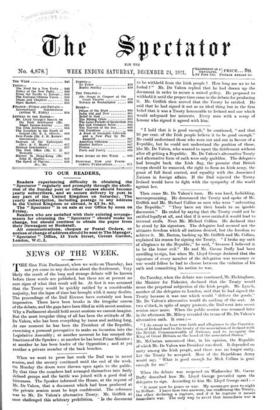Then came Mr. De Valera:1i turn. He was hard, forbidding,
uncompromising. He denounced the Treaty and spoke of Mr. Griffith and Mr. Michael Collins as men who were " subverting the Republic." " They have set their hands to an ignoble document." He ended by saying that the Treaty could not be ratified legally at all, and that if it were ratified it would lead to internal strife. Next Mr. Michael Collins. He declared that he stood by his signature. The delegates had secured not the ultimate freedom which all nations desired, but the freedom to achieve it. Mr. Barton, backing up Mr. Griffith and Mr. Collins, explained his reason for signing the Treaty. " I broke my oat h of allegiance to the Republic," he said, " because I believed it to be the lesser evil." He and Mr. Gavan Duffy had been unwilling to sign, but when Mr. Lloyd George declared that the signature of every member of the delegation was necessary or war would follow he had to choose between the violation of his oath and committing his nation to war.


































